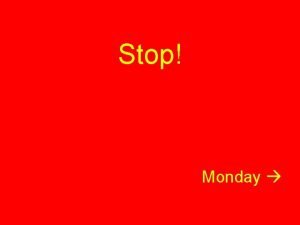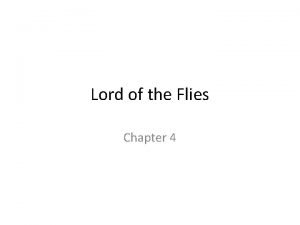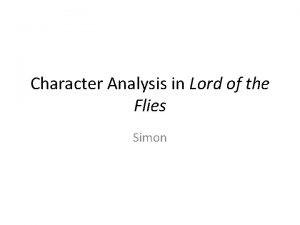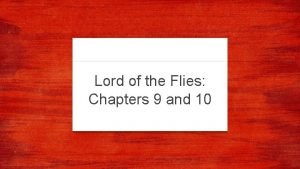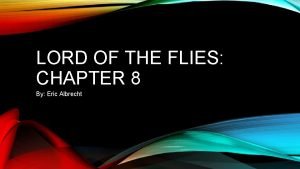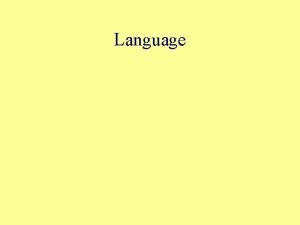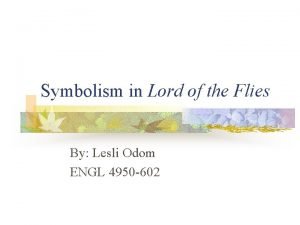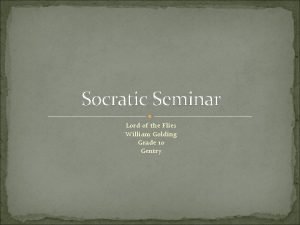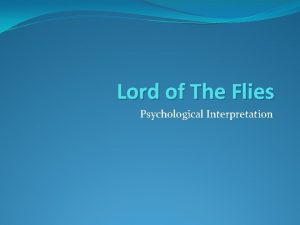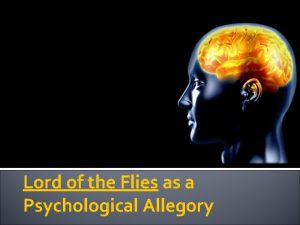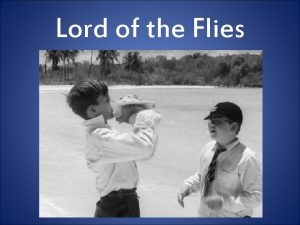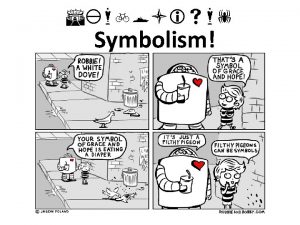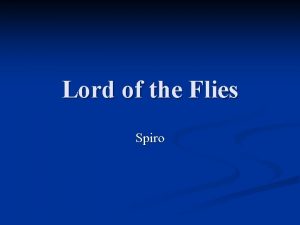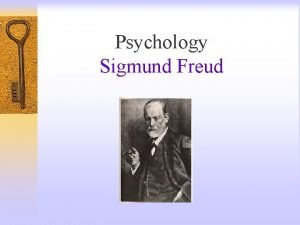Psychological Analysis of Lord of the Flies Sigmund














- Slides: 14

Psychological Analysis of Lord of the Flies

Sigmund Freud: Father of Psychiatry £ First Use of “The Couch” £ Felt That Infancy Shaped People £ Obsessed With Breast Feeding & Toilet Training

Each Person Carried Within Himself/Herself Three Basic Parts Of Personality

ID… £ Born with our “Id” £ Allows us to get our basic needs met (I. e. food) £ Based on the pleasure principle (if it feels good, do it) £ Doesn’t care about reality or the needs of others (baby cries in the middle of the night)

Let go of my “Ego” £ First five years of life £ Based on reality principle £ Realization that other people have needs, desires £ You can hurt by trying to fulfill impulses £ Ego must take care of id while taking reality into account

Superego £ Ages 5 and up £ Moral part of human beings £ Similar to conscience £ Develops due to moral and ethical restraints by caregivers £ Knows/Wants to do what is right

Healthy Person: Ego is the Strongest Is able to 1) Satisfy id 2) Not violate the superego 3) Stay connected to the reality of the situation

Id TOO Strong • Behavior based on selfgratification • Impulses cannot be controlled

Superego Too Strong £ Person directed by rigid code of morals. £Unbending and Judgmental

Kiersey: Theory of Personality £ People are different. They want different things (opposed to Freud) £ We perceive difference as madness, badness, stupidity > and flaws. £ 1962 - Myers & Briggs developed personality test: takes behaviors and attitudes and translates them into personality type. 4 basic types.

Rational £ Planning £ Inventing £ Confident £ Strong willed £ Practical £ Seeking Knowledge £ Live in the present £ 5 -7% of population £ Examples: Einstein, Mc. Arthur, Napoleon, Walt Disney, Lincoln. £ Often drawing to science, strategy

Idealist £ Diplomatic £ Sympathetic £ Ethical £ Intuitive £ Romantic £ Future- Driven £ Spiritual £ Teaching others £ 8 -10% £ Examples: Gandhi (seeking peace), Eleanor Roosevelt (champion of the underdog)

Guardians £ Protecting £ Supervising £ Reliable £ Responsible £ Helpful £ Seek security £ Concerned about the future £ Conforming as children £ 40 -45% of the population £ Examples: George Washington, Colin Powell, Queen Elizabeth,

Artisan £ Daring £ Spontaneous £ Adaptable £ Physically gifted £ Live in the now £ Permissive £ Play oriented £ Want to be where the action is £ 35 -40% of the population £ Examples: Picasso, Hemmingway, Michael Jordan, Magic Johnson, Lindbergh, Mozart
 Allegories in lord of the flies
Allegories in lord of the flies Lord of the flies character analysis chart
Lord of the flies character analysis chart What is the theme of chapter 9 in lord of the flies
What is the theme of chapter 9 in lord of the flies Lord of the flies chapter summary 4
Lord of the flies chapter summary 4 The lord of the flies chapter summary
The lord of the flies chapter summary Lord of the flies characters analysis
Lord of the flies characters analysis Lotf chapter 9
Lotf chapter 9 Summary of lord of the flies chapter 8
Summary of lord of the flies chapter 8 Time flies like arrow fruit flies like banana
Time flies like arrow fruit flies like banana Lord of the flies book cover
Lord of the flies book cover Lord of the flies letter home
Lord of the flies letter home Samneric lord of the flies
Samneric lord of the flies What are symbols in lord of the flies
What are symbols in lord of the flies Onomatopoeia in shrek
Onomatopoeia in shrek Lord of the flies seminar questions
Lord of the flies seminar questions

